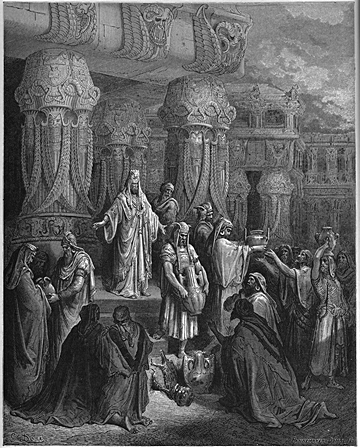Ezra 1
1 During the first year that Cyrus ruled [the] Persian [Empire], he did something that fulfilled what Jeremiah had prophesied. Yahweh motivated Cyrus to write this message, and then Cyrus sent this message throughout his empire:
Nell'anno primo del regno di Ciro, re di Persia, perché si adempisse la parola che il Signore aveva detto per bocca di Geremia, il Signore destò lo spirito di Ciro re di Persia, il quale fece passare quest'ordine in tutto il suo regno, anche con lettera:
2 “I, King Cyrus, who rule [the] Persian [Empire], declare this: 'Yahweh, the God [who is in/rules] from heaven, has caused me to become the ruler of all the kingdoms [that I know about] on the earth. And he has appointed me [to enable his people] to build a temple for him in Jerusalem, in Judah [land].
«Così dice Ciro re di Persia: Il Signore, Dio del cielo, mi ha concesso tutti i regni della terra; egli mi ha incaricato di costruirgli un tempio in Gerusalemme, che è in Giudea.
3 All you people who belong to God may go up to Jerusalem to rebuild this temple for Yahweh, the God who lives in Jerusalem, the God [who is worshiped by you] Israeli people. I desire/hope that your God will be with you [and help those who go there].
Chi di voi proviene dal popolo di lui? Il suo Dio sia con lui; torni a Gerusalemme, che è in Giudea, e ricostruisca il tempio del Signore Dio d'Israele: egli è il Dio che dimora a Gerusalemme.
4 Those people who are in places where Israelis are living, whose ancestors were exiled here, should contribute silver and gold to those who go. They should also give them supplies [that they will need for the journey to Jerusalem]. They should also give them some livestock, and gifts of money to help build the temple of God in Jerusalem.'”
Ogni superstite in qualsiasi luogo sia immigrato, riceverà dalla gente di quel luogo argento e oro, beni e bestiame con offerte generose per il tempio di Dio che è in Gerusalemme».
5 Then God motivated some of the priests and (Levites/men who did work in the temple) and some of the leaders of the tribes that were descended from Judah and Benjamin to return to Jerusalem. Those whom God motivated got ready to return to Jerusalem and build the temple for Yahweh there.
Allora si misero in cammino i capifamiglia di Giuda e di Beniamino e i sacerdoti e i leviti, quanti Dio aveva animato a tornare per ricostruire il tempio del Signore in Gerusalemme.
6 All of their neighbors helped them by giving them things made of silver and things made of gold, and supplies for the journey, and livestock. They also gave them other valuable gifts, and also gave them money [to buy things for building the temple].
Tutti i loro vicini li aiutarono validamente con oggetti d'argento e d'oro, con beni e bestiame e con oggetti preziosi, e inoltre quello che ciascuno offrì volontariamente.
7 King Cyrus brought out the valuable things that King Nebuchadnezzar’s [soldiers] had taken from the temple of Yahweh in Jerusalem and put in the temple of Nebuchadnezzar’s gods [in Babylon].
Anche il re Ciro fece trarre fuori gli arredi del tempio, che Nabucodònosor aveva asportato da Gerusalemme e aveva deposto nel tempio del suo dio.
8 Cyrus commanded Mithredath, the treasurer of [the] Persian [Empire], to count all these items and then give them to Sheshbazzar, the leader of [the group that was going to return to] Judah.
Ciro, re di Persia, li fece trarre fuori per mano di Mitridate il tesoriere, che li consegnò a Sesbassar, principe di Giuda.
9 This is a list of the items that Cyrus donated: 30 large gold dishes 1,000 large silver dishes 29 silver (censers/incense burning pans)
Bacili d'oro: trenta; bacili d'argento: mille; coltelli: ventinove; Questo è il loro computo:
10 30 gold bowls 410 silver bowls 1,000 other items.
coppe d'oro: trenta, coppe d'argento di second'ordine: quattrocentodieci; altri arredi: mille.
11 All together, there were 5,400 items made of silver or gold, that [were given to] Sheshbazzar [to] take with him when he and the others returned to Jerusalem.
Tutti gli oggetti d'oro e d'argento eranocinquemilaquattrocento. Sesbassar li riportò da Babilonia a Gerusalemme, in occasione del ritorno degli esuli.





















